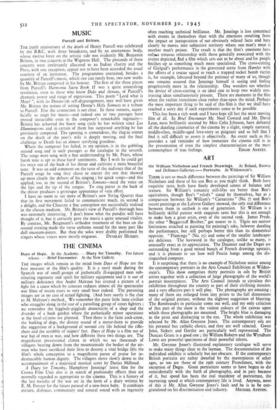MUSIC
Purcell and Britten.
THE 250th anniversary of the death of Henry Purcell was celebrated by the B.B.C. with three broadcasts, and by an anonymous body, whose motive force on the artistic side was evidently Mr. Benjamin Britten, in two concerts at the Wigmore Hall. The proceeds of these concerts were irrelevantly allocated to an Indian charity and the Press, with one exception, appear not to have been accorded the usual courtesy of an invitation. The programmes contained, besides a quantity of Purcell's music, which one can rarely hear, two new works by Mr. Britten composed in his honour. The first of the three pieces from Purcell's Harmonia Sacra- Book II was a quite astonishing revelation, even to those who know Dido and Aeneas, of Purcell's dramatic power and range of expression. This poem "Lord what is Man? ", with its Donne-ish self-disparagement, may well have given Mr. Britten the notion of setting Donne's Holy Sonnets as a tribute to Purcell. Else the connection is not clear. In these sonnets, super- ficially so inapt for music—and indeed one or two passages have proved intractable even to the composer's remarkable ingenuity— Britten has achieved the finest song cycle he has written since Les Illuminations and in certain of them has surpassed anything he has previously composed. The opening is tremendous, the elegiac sonnet on the death of the poet's wife is deeply moving, and the final challenge to Death has an almost terrifying grandeur. Where the composer has failed, in my opinion, is in the gabbling second song and in such passages as the catalogue in the seventh. The songs were sung with a fine understanding by Mr. Pears, whose harsh tone is apt to these !tarsi- sentiments. But I wish he could get his voice out of the back of his throat and cultivate a more beautiful tone. It was an odd comment on the taste of the audience that of the Purcell songs he sang they chose to encore the one that showed up most clearly the defects of his singing ; for quick songs—and this applied, too, to the second of Britten's Sonnets—need the voice on the lips and the tip of the tongue. To sing patter in the back of the throat produces a grotesque appearance of vain effort.
I have no room to say more of Britten's new String Quartet than that its first movement failed to communicate much, its second is a delight, and the Chacony a fine conception not successfully realised in the chosen medium. Mr. Britten's view of Purcell's thorough bass was extremely interesting. I don't know what the pundits will have thought of it, but it certainly gave the music a quite unusual vitality. By contrast, Mr. Bergmann's orthodox treatment of the bass on the second evening made the verse anthems sound for the most part like dull museum-pieces. But then the solos were drably performed by
singers whose voices were mostly exiguous. DYNELEY HUSSEY.






























 Previous page
Previous page